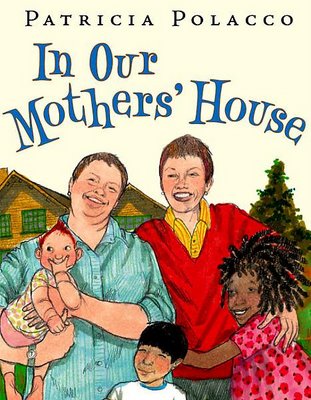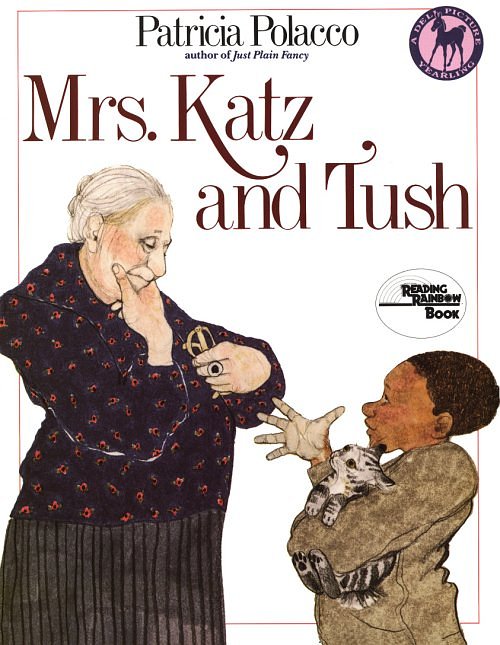 Today I’m going to be a little daring and omit the long-winded, over-arching opening paragraph to get directly to the story. The American Civil Liberties Union (ACLU) and the ACLU of Utah are suing the Davis School District, twenty-four miles outside of Salt Lake City, for removing a children’s picture book from the shelves of its elementary school libraries. Why? The book, In Our Mothers’ House by Patricia Polacco, focuses on a family with two mothers.
Today I’m going to be a little daring and omit the long-winded, over-arching opening paragraph to get directly to the story. The American Civil Liberties Union (ACLU) and the ACLU of Utah are suing the Davis School District, twenty-four miles outside of Salt Lake City, for removing a children’s picture book from the shelves of its elementary school libraries. Why? The book, In Our Mothers’ House by Patricia Polacco, focuses on a family with two mothers.
Anyone who knows me well knows that I’m a children’s literature snob. Dr. Seuss is my Dostoevsky. Therefore, I felt it was my duty to share this information. Patricia Polacco, a talented and prolific author of children’s books, published In Our Mothers’ House in 2009. It is just one of her many stories that paints a picture celebrating cultural difference.
Before I get too caught up in kvelling over the author, let me detail the case. The trouble began in late 2011 when a Windridge Elementary School kindergartner borrowed In Our Mothers’ House. His parents were appalled and immediately complained to the school’s administration. To appease the parents the librarian moved the book to the shelves meant for older kids.
Unsatisfied with the results, the offended parents took their case to the Davis School Board. In the spring of 2012 the Library Steering Committee was presented with a signed petition and a series of written complaints which can be summed up best with the comment: “[The Book] normalizes a lifestyle we don’t agree with.” (ACLU Complaint Record)
Bowing to parental pressure, the district administration ordered the book’s removal from all elementary library shelves, placing them behind the librarian’s desk. To substantiate its decision, the Board cited Utah State law for School Health Instruction 53A-13-101 that prohibits “the advocacy of homosexuality.” To date, all students may only access the book with signed parental permission.
In a state where 58% of the population is Mormon, the reaction is not surprising. (The Davis County Chamber of Commerce) However, for local resident Tina Weber, the school’s actions were not at all acceptable. After no response from the district, she turned to the ACLU for support. In an interview with the Salt Lake Tribune, she explained:
As a parent, I believe that it’s my role to help [my children] understand certain issues … I don’t believe it’s for anybody else to tell me how to raise my family.
On November 13, 2012, the ACLU filed its lawsuit. The press release read:
The American Civil Liberties Union and the ACLU of Utah filed a lawsuit against the Davis School District after elementary schools in the district were instructed to remove a children’s book about a family with same-sex parents from library shelves…..Public schools cannot remove books from the library shelves because some people disagree with the books’ viewpoint. Under the First amendment, parents can place limits on what their own children can read but they cannot restrict access to books for everybody else’s children.
Over the past few months Tina Weber has garnered the support of many local organizations including, The Utah Library Association, Utah Pride Center, Ogden OUTreach Resource Center, Unitarian Universalist Church of Ogden and Parents, Families and Friends of Lesbians and Gays (PFLAG). At this point no court dates are set and the book still sits behind the librarians’ desk.
Unfortunately, this was not the first time that In Our Mothers’ House has made waves. As reported by the Texas ACLU, Polacco’s book is currently on the banned book list for all Texas public schools. Of course, as a concerned citizen, I immediately checked with my local schools and public libraries. I’m happy to report that In Our Mothers’ House is available here. Fortunately, I was able to snatch up a copy before the Black Friday rush on library borrowing.
In June The National Coalition Against Censorship (NCAC) caught up with Patricia Polacco to interview her about the book, its inspiration, and the Utah ban.
Aside from being beautiful and well-written, Polacco’s books, including In Our Mothers’ House, play an important role in an increasingly heterogeneous world. Just look at our 113th U.S. Congress. According to Pew Forum, its composition demonstrates the “continuing, gradual increase in religious diversity that mirrors trends in the country as a whole.” It will house its first Buddhist Senator, its first Hindu in either chamber, a declared “none,” an increase in Catholics as well as small population of Jews, Muslims, and Mormons.
 Demographics are changing and we all have get use to it. What better way to do that than to curl up with a good book. Through her unique style of storytelling, Polacco celebrates difference by connecting us to her characters, no matter who they are and who we are, through the universal components of the human experience. I challenge anyone to get through Our Mothers’ House with a dry eye. By its end the story evolves into something so human that none of the details matter.
Demographics are changing and we all have get use to it. What better way to do that than to curl up with a good book. Through her unique style of storytelling, Polacco celebrates difference by connecting us to her characters, no matter who they are and who we are, through the universal components of the human experience. I challenge anyone to get through Our Mothers’ House with a dry eye. By its end the story evolves into something so human that none of the details matter.
In addition, Polacco demonstrates a powerful respect for family tradition, cultural heritage, the wisdom of elders, and the power of friendship. Her stories offer a window into life – many of which are autobiographical derived from her own experiences as a dyslexic child. Her books don’t preach or lecture. They aren’t political or argumentative. They are just that – stories.

In the struggle for social acceptance, not all advances are made in the court room or on the battle field. Some of the biggest strides can be made in the home with a warm fire and a good storybook. But in Utah, that opportunity is being threatened. As Patricia Polacco stated in her interview, the book ban is a serious First Amendment issue. And, the ACLU agreed.
Just as the government cannot censor her writing; it should not have the power to censor our access to her writing. I make the choice on what’s appropriate for me and for my children. And, I choose Patricia Polacco’s books. Two days ago, I read In Our Mothers’ House to my daughter. She listened intently with no questions. Perhaps, in the future, when she meets a child with two mothers, she’ll remember Marmi and Meema and just how much they loved their kids. That is how change begins. And that is what matters.
Current Polacco books in my library:
- Rechenka’s Eggs
- Mrs Katz and Tush
- Pink and Say
- Just Plain Fancy
- Thank You, Mr Faulkner
- Junkard Wonders
- Babushka Baba Yaga
- Betty Doll
- Babushka’s Doll
- Thunder Cake
- The Trees of the Dancing Goats
- In My Mothers’ House (just ordered from Amazon)
The Wild Hunt is not responsible for links to external content.
To join a conversation on this post:
Visit our The Wild Hunt subreddit! Point your favorite browser to https://www.reddit.com/r/The_Wild_Hunt_News/, then click “JOIN”. Make sure to click the bell, too, to be notified of new articles posted to our subreddit.
Excellent article Heather. sounds like I need to make a trip to my local library 🙂
I note that my local library system has 8 copies, but in the closest (Santa Maria, CA) it is shelved in the “in-between” section.
I think an interesting case would be a set of parents sued the complaining parents on behalf of their children for engaging in a criminal conspiracy to violate their children’s rights under the First Amendment in Federal Court.
My initial reaction to this story surprised me. It was, “Kids need this book!” When I was a child and teenager, books about people who were different from me were immensely helpful in letting me know there was a wider world, and there just might be people who weren’t cookie-cutter versions of my family and the people they thought appropriate for me to know. And when my parents divorced when I was 15, I covertly searched for books about kids going through that; I recall that I found one that was like six years below my reading level. It would have helped to find what was going on with me reflected in books.
These parents need to come to grips with the fact that they don’t control the entire world, nor do they define normal for everyone.
Being something of a law-head, I would normally go to the First Amendment violations that I think are occurring here. And I think I’m correct and believe the law will stand. But even more important, I think books like this help young people make sense of the world around them, and they shouldn’t be deprived of them.
Cathryn Meer Bauer
The First Amendment gives parents the right to decide what their children read, but obviously these parents weren’t very attentive when their child checked the book out of the library. Now they want to cut everybody else’s rights so they don’t have to pay attention. I can assure you my children don’t check books out of the library with out me knowing what they are about. I don’t ever censor their choices, because I have decided not to, but I do pay attention and get ready to rise issues to discuss with them if I feel the book they have chosen needs it (this happens often here in Spain with older books that are sometimes racist or sexist).
There is always the petty response:
Get a petition going to ban Bibles from school libraries as that book ‘advocates a lifestyle I disagree with.’